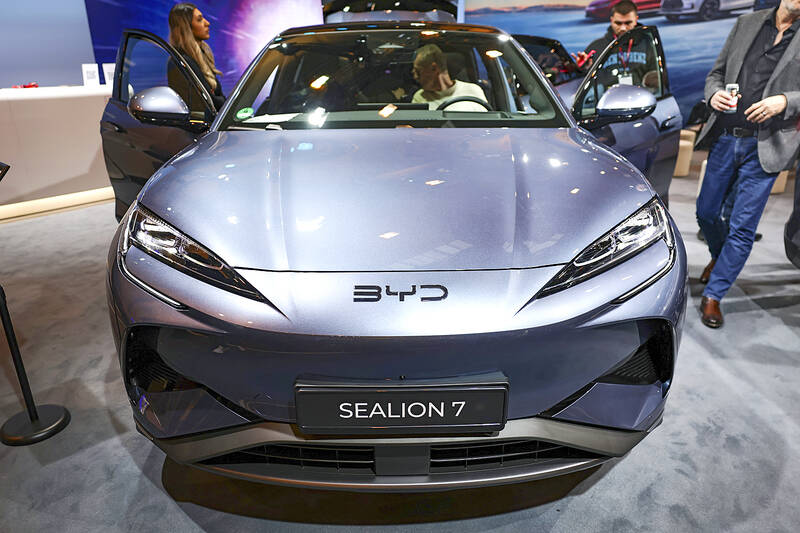China’s BYD Co (比亞迪) enjoyed a year-end surge to push total sales to 4.25 million passenger cars last year, narrowing its gap with Tesla Inc as the two vie for the crown of top-selling electric vehicle (EV) maker of the year.
The Shenzhen-based carmaker, which stopped making vehicles entirely powered by fossil fuels in 2022, hit a new monthly sales record last month, spurred on by subsidies and offering extra incentives to buyers.
BYD sold 509,440 plug-in hybrid and pure-electric passenger vehicles last month, the company said yesterday. The figure includes 207,734 EVs, taking the annual tally of battery-powered car sales to 1.76 million. Overall annual sales increased 41 percent year-on-year.

Photo: EPA-EFE
The rise of BYD as a best-selling car brand stands in contrast to the turmoil facing a growing number of legacy auto giants like Nissan Motor Co, Volkswagen AG and Stellantis NV. Western car brands have faced tumbling sales in China, while also lagging behind on the EV transition.
Tesla will unveil its fourth-quarter sales figures later this week. The Elon Musk-led company needs to deliver at least 515,000 EVs in the final three months of last year to meet its guidance for “slight growth” in annual sales, or 1.81 million deliveries, which would be a quarterly record for the company. Analyst estimates are for 510,400 deliveries, just shy of Tesla’s expectations.
By the third quarter, BYD had sold 1.16 million EVs, lagging Tesla by 124,100. However, the Chinese company has seen a last-quarter surge to narrow the gap with its US rival.
BYD’s surge will help cement its place among the top-selling carmakers globally. Its rise in total sales puts it near to beating Ford Motor Co and Honda Motor Co on an annual basis too. Higher sales will tip the company’s annual revenue over US$100 billion for the first time.
BYD’s gains have been fueled by domestic Chinese sales — and aided in the second half of the year by increased subsidies to convince drivers to ditch gasoline cars.
Its target to sell roughly half-a-million vehicles outside China has fallen short of expectations in the face of pushback from the European Union, which has imposed additional tariffs on Chinese EVs.
In Brazil, one of its biggest overseas markets, BYD is under scrutiny over allegations of slave-like conditions for some construction workers building a new EV factory.

NEW IDENTITY: Known for its software, India has expanded into hardware, with its semiconductor industry growing from US$38bn in 2023 to US$45bn to US$50bn India on Saturday inaugurated its first semiconductor assembly and test facility, a milestone in the government’s push to reduce dependence on foreign chipmakers and stake a claim in a sector dominated by China. Indian Prime Minister Narendra Modi opened US firm Micron Technology Inc’s semiconductor assembly, test and packaging unit in his home state of Gujarat, hailing the “dawn of a new era” for India’s technology ambitions. “When young Indians look back in the future, they will see this decade as the turning point in our tech future,” Modi told the event, which was broadcast on his YouTube channel. The plant would convert

‘SEISMIC SHIFT’: The researcher forecast there would be about 1.1 billion mobile shipments this year, down from 1.26 billion the prior year and erasing years of gains The global smartphone market is expected to contract 12.9 percent this year due to the unprecedented memorychip shortage, marking “a crisis like no other,” researcher International Data Corp (IDC) said. The new forecast, a dramatic revision down from earlier estimates, gives the latest accounting of the ongoing memory crunch that is affecting every corner of the electronics industry. The demand for advanced memory to power artificial intelligence (AI) tasks has drained global supply until well into next year and jeopardizes the business model of many smartphone makers. IDC forecast about 1.1 billion mobile shipments this year, down from 1.26 billion the prior

People stand in a Pokemon store in Tokyo on Thursday. One of the world highest-grossing franchises is celebrated its 30th anniversary yesterday.

Zimbabwe’s ban on raw lithium exports is forcing Chinese miners to rethink their strategy, speeding up plans to process the metal locally instead of shipping it to China’s vast rechargeable battery industry. The country is Africa’s largest lithium producer and has one of the world’s largest reserves, according to the US Geological Survey (USGS). Zimbabwe already banned the export of lithium ore in 2022 and last year announced it would halt exports of lithium concentrates from January next year. However, on Wednesday it imposed the ban with immediate effect, leaving unclear what the lithium mining sector would do in the